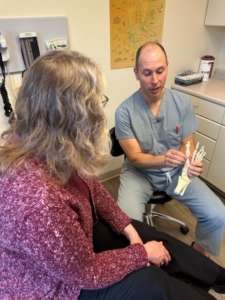Inland Hospital podiatrist shares foot health tips

Dr. Jared Wilkinson, DPM, with Northern Light Podiatry in Waterville says foot health can say a lot about a person’s overall health. Contributed photo
You depend on your feet to get you everywhere in life but are you giving them the respect and attention they deserve? April is national Foot Health month and Northern Light Podiatry is stepping up to help you love your feet!
The average person takes thousands of steps a day so good foot health is critical to an active life. Foot health can impact your knees, hips, back, and your attitude! The American Podiatric Medical Association estimates that twenty percent of the population has at least one foot problem every year so it’s a topic worth more ‘sole’ searching!
Dr. Jared Wilkinson, DPM, is with Northern Light Podiatry, in Waterville. He has nearly 20 years experience as a board-certified podiatrist. We sat down with him for a rapid fire Q & A about all things feet – from bunion treatments to the effects of toenail polish, smelly feet, and much more.
Can my foot health actually indicate my overall health?
Dr. Wilkinson: Foot health is definitely an indicator of overall health as your feet can show skin conditions, vein/artery problems, and neurological issues. Sometimes foot deformity and mechanical problems can cause stress on other nearby joints, which can be an indicator about overall health. Those with diabetes should pay close attention to their foot health.
What are some of the most common foot issues you see as a podiatrist?
Dr. Wilkinson: We see ingrown toenails, warts, heel pain, skin lesions, nail deformities and changes, foot and ankle deformity including bunions, flatfoot deformity, and various fractures amongst many other foot and ankle issues.
What causes bunions, and what can be done about them?
Dr. Wilkinson: Bunions can be a potentially debilitating problem of the big toe joint which can cause physical deformity of the foot along with joint changes over time. Basically, it is a deviation of the big toe toward the lesser toes with a prominent bump on the inside part of the foot. That “bump” is complex – it’s a reflection of an unstable joint that makes your bone drift out of alignment. Typically, it is a slow onset or progression that can start as a child. Usually there is a genetic predisposition to bunions.
To treat bunions, we usually start with addressing some basics, such as stretching and wearing appropriate supportive shoe gear with arch supports. Wide toe box supportive shoes can be helpful for some people. Various toe splints spacers can also be used but they do not cure the bunion. Sometimes anti-inflammatories or pain reducers can be helpful initially.
If those treatments don’t help, and the pain of a bunion is causing a disruption in your daily living and activities, then it may be time to look at a surgical treatment. I’m excited about a new 3D bunion surgery called Lapiplasty® that we’re doing now at Northern Light Inland Hospital. In my experience, it’s been very helpful because it helps us fix the root cause of the bunion problem – an unstable joint.
Why do my feet smell sometimes?
Dr. Wilkinson: Smelly feet can be caused by a condition called hyperhidrosis, where the sweat glands in various parts of the body, which are used for temperature regulation, produce greater amounts of sweat than is required. Combine this with the foot being in a dark, covered place with a shoe and sock, it can contribute to excessive moisture and odor. Sometimes a condition called bromhidrosis can also occur which has a bacterial component and causes odor.
Conservative treatments include frequent sock changes and choosing moisture wicking material such as polypropylene socks as opposed to cotton; shoes that have breathable material are also an option. Sometimes an antiperspirant can be applied topically to the bottom of the feet which can also help. If the condition does not respond in several weeks, ask for a formal workup as there could be other causes for the smell.
Can long-term use of toenail polish cause problems?
Dr. Wilkinson: Toenail polish can potentially cause nail plate damage due to the chemicals and adhesives involved, especially if worn long-term. Toenail polish can be worn for short periods of time but should be removed periodically to assess the health of the nail. Certain health conditions, such as renal or cardiovascular disease, metabolic disturbance, and auto immune conditions, among others, can manifest with nail changes or changes around the nail structure itself, which can be hidden with prolonged use of nail polish.
Do feet grow as we age? I’m a shoe size bigger than I was 25 years ago.
Dr. Wilkinson: Your feet are not actually ‘growing’, but everyone’s foot size does tend to increase as we age because the foot architecture is slowly collapsing due to loss of elasticity and strength in the ligaments and tendons. It’s very common for a person to gain a shoe size in length and width over the course of their lifetime due to this natural progression.
What is one of the most common questions you hear from people in your job?
Dr. Wilkinson: One of the most common questions I get is “How can you look at feet all day?” I jokingly tell people that there are probably worse things to look at all day and somebody has to do it! All kidding aside, I enjoy being able to focus on one specific anatomic location and with the foot and ankle it allows me to see and treat a wide variety of medical issues. One of the great enjoyments of my job is being able to help people improve their overall health by assessing their foot and ankle problems and coming up with a plan whether it be simple or complicated. Happy feet can have a significant improvement on a person’s overall quality of life.
Ask your primary care provider for a referral to Northern Light Podiatry or learn more at northernlighthealth.org/Podiatry-Waterville.
Responsible journalism is hard work!
It is also expensive!
If you enjoy reading The Town Line and the good news we bring you each week, would you consider a donation to help us continue the work we’re doing?
The Town Line is a 501(c)(3) nonprofit private foundation, and all donations are tax deductible under the Internal Revenue Service code.
To help, please visit our online donation page or mail a check payable to The Town Line, PO Box 89, South China, ME 04358. Your contribution is appreciated!






Leave a Reply
Want to join the discussion?Feel free to contribute!